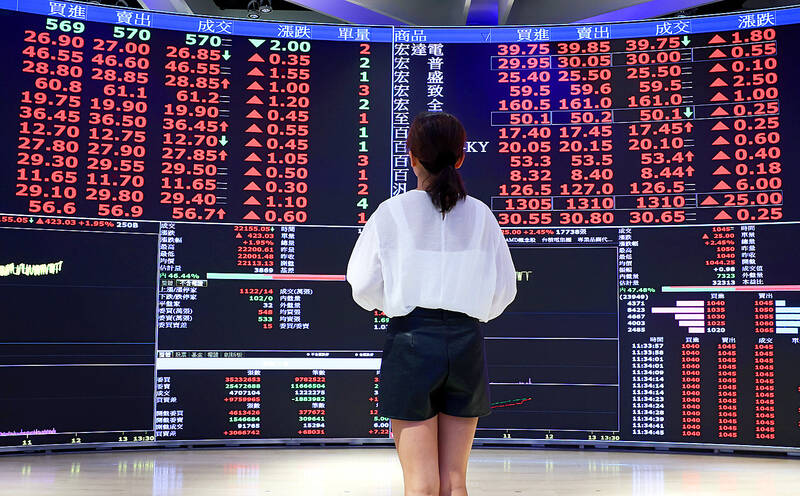Shares in Taiwan rebounded sharply yesterday, recovering from a slump to close above the key 22,000-point mark.
The rally was driven by buying sparked by US President Donald Trump’s announcement that Israel and Iran had reached a ceasefire, dealers said.
After falling 1.42 percent on Monday, the TAIEX rose by 456.74 points, or 2.10 percent, to close at 22,188.76, with turnover expanding to NT$393.920 billion (US$13.34 billion) from NT$307.601 billion the previous day, Taiwan Stock Exchange data showed.

Photo: CNA
Foreign institutional investors bought a net NT$29.18 billion of shares on the main board after selling a net NT$15.21 billion on Monday, the data showed.
“Many investors seemed to place more faith in Trump’s announcement, with bargain hunters actively snapping up discounted stocks,” Mega International Investment Services Corp (兆豐國際投顧) analyst Alex Huang (黃國偉) said.
“The electronics sector once again acted as a key driver, helping to restore the TAIEX to a healthier technical level above 22,000 points,” Huang added.
Taiwan Semiconductor Manufacturing Co (台積電), the market’s most heavily weighted stock, rose 2.94 percent to NT$1,050, contributing about 240 points to the TAIEX’s rise.
Hon Hai Precision Industry Co (鴻海精密), a key iPhone assembler and artificial intelligence (AI) developer, added 2.88 percent to NT$160.5.
Elsewhere in Asia, Tokyo’s Nikkei 225 rose 1.1 percent to 38,790.56 and the Hang Seng in Hong Kong gained 2.1 percent to 24,177.07. The Shanghai Composite index climbed 1.2 percent to 3,420.57.
In South Korea, the KOSPI jumped 3 percent to 3,103.64, while Australia’s S&P/ASX 200 gained 1 percent to 8,555.5.
In early European trading, Germany’s DAX leaped 2.2 percent to 23,780.32, while the CAC 40 in Paris added 1.4 percent to 7,645.58. Britain’s FTSE 100 was up 0.4 percent at 8,793.18.
International crude oil prices fell further after tumbling on Monday as fears subsided of an Iranian blockade of the Strait of Hormuz, a vital waterway for shipping crude.
The price of oil initially jumped 6 percent after trading began on Sunday night, a signal of rising worries as investors got their first chance to react to the US bombings.
However, it quickly shed all those gains, with US benchmark crude falling 7.2 percent. It dropped further early yesterday, down 3 percent to US$66.44 per barrel.
Brent crude, the international standard, shed 3.1 percent early yesterday to US$68.33.
“The Middle East may still be smoldering, but as far as markets are concerned, the fire alarm has been shut off,” SPI Asset Management managing partner Stephen Innes said in a commentary.
Additional reporting by AP

NOT JUSTIFIED: The bank’s governor said there would only be a rate cut if inflation falls below 1.5% and economic conditions deteriorate, which have not been detected The central bank yesterday kept its key interest rates unchanged for a fifth consecutive quarter, aligning with market expectations, while slightly lowering its inflation outlook amid signs of cooling price pressures. The move came after the US Federal Reserve held rates steady overnight, despite pressure from US President Donald Trump to cut borrowing costs. Central bank board members unanimously voted to maintain the discount rate at 2 percent, the secured loan rate at 2.375 percent and the overnight lending rate at 4.25 percent. “We consider the policy decision appropriate, although it suggests tightening leaning after factoring in slackening inflation and stable GDP growth,”

DIVIDED VIEWS: Although the Fed agreed on holding rates steady, some officials see no rate cuts for this year, while 10 policymakers foresee two or more cuts There are a lot of unknowns about the outlook for the economy and interest rates, but US Federal Reserve Chair Jerome Powell signaled at least one thing seems certain: Higher prices are coming. Fed policymakers voted unanimously to hold interest rates steady at a range of 4.25 percent to 4.50 percent for a fourth straight meeting on Wednesday, as they await clarity on whether tariffs would leave a one-time or more lasting mark on inflation. Powell said it is still unclear how much of the bill would fall on the shoulders of consumers, but he expects to learn more about tariffs

Greek tourism student Katerina quit within a month of starting work at a five-star hotel in Halkidiki, one of the country’s top destinations, because she said conditions were so dire. Beyond the bad pay, the 22-year-old said that her working and living conditions were “miserable and unacceptable.” Millions holiday in Greece every year, but its vital tourism industry is finding it harder and harder to recruit Greeks to look after them. “I was asked to work in any department of the hotel where there was a need, from service to cleaning,” said Katerina, a tourism and marketing student, who would

i Gasoline and diesel prices at fuel stations are this week to rise NT$0.1 per liter, as tensions in the Middle East pushed crude oil prices higher last week, CPC Corp, Taiwan (台灣中油) and Formosa Petrochemical Corp (台塑石化) said yesterday. International crude oil prices last week rose for the third consecutive week due to an escalating conflict between Israel and Iran, as the market is concerned that the situation in the Middle East might affect crude oil supply, CPC and Formosa said in separate statements. Front-month Brent crude oil futures — the international oil benchmark — rose 3.75 percent to settle at US$77.01